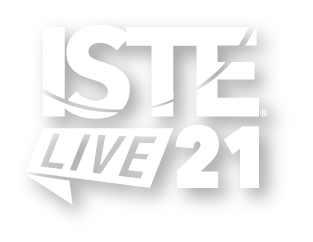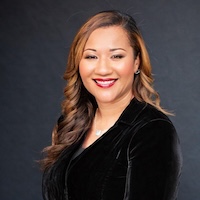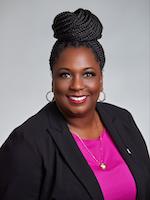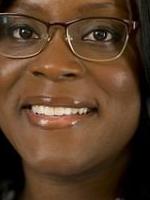

Why Digital Equity Matters NOW! |
Listen and learn : Panel
Dr. Dr. Patricia Brown Keri Hennessy-Wilson Matthew Hiefield Carla Jefferson Valerie Lewis
As we reimagine and further define digital equity, there's an increasing need for professional learning opportunities on this critical topic. We'll lead a discussion about the multiple dimensions of digital equity, with the goal of determining actionable steps for K-12 campuses.
| Audience: | Principals/head teachers, Teachers, Technology coordinators/facilitators |
| Skill level: | Beginner |
| Attendee devices: | Devices useful |
| Attendee device specification: | Smartphone: iOS Laptop: Chromebook, Mac, PC Tablet: Android, iOS |
| Topic: | Equity & inclusion |
| ISTE Standards: | For Education Leaders: Equity and Citizenship Advocate
Leader
|
According to Davis, Fuller, Jackson, Pittman, and Sweet (2007), digital equity is defined as “equal access and opportunity to digital tools, resources, and services to support an increase in digital knowledge, awareness, and skills.” Over the past decade, teachers and administrators continue to grapple with what this truly means for the K12 classroom. Additionally, they are seeking new ways to close the digital divide while attempting to adequately redefine the term “digital equity” as our population of students continue to change demographically. As we seek a clear and shared definition, we must re-imagine professional development to effectively prepare teachers for this work in the midst of rapid district adoptions of digital content.
Over the past few years, we have engaged ISTE conference attendees through rich discussions, ignites, and keynotes that have addressed diversity and digital equity; however, we realize that as our student population continues to grow and change so should the climate of the professional learning experience and how we support students. As the Digital Equity PLN, we feel that we can't simply talk about digital equity. We need action! To be most effective in our actions, we need opportunities to share perspectives and to engage in meaningful professional learning through a broad range of perspectives.
We hope to facilitate a dialogue in a space filled with all stakeholders while re-imagining “digital equity” in today’s landscape in order to push pass using this term as a buzzword only. During our time together, we will look at a wide range of professional learning opportunities, including several ISTE affiliates, and focus on what they are doing differently to clearly identify areas for personal and professional improvement. The goal is to determine the most effective ways in which we can support one another when doing work related to digital equity.
Evidence of success will be determine through the development of collaborative actionable steps and a post assessment about new learnings and new professional learning opportunities related to digital equity. A shared site with curated resources and additional goals and/or recommendations will also be made available for attendees. Although we have mentioned several key ideas to help determine success, we recognize that true success in this area evolves over time through an ongoing commitment to doing the necessary work to achieve digital equity for all.
The connection to "technology" here is about Davis’ definition for digital equity above; however, we are also focused on the bigger picture which is engaging the key stakeholders in a dialogue about necessary change. We may not close the digital equity gap one session (and that is not our intention), but we can all leave with new ideas and plans that enact authentic change beyond the buzz.
Attendees participate in a Google Slide's Live Q&A feature for the duration of this panel.
We will conduct a brief Q&A based on questions curated through our online communities on this topic. (5-10 minute)
We will then share short clips from community examples of “digital equity”. We will curate their "how" for the room to begin thinking about how to support others in this work. (10 minutes)
Another Short Q&A based on examples. (10 minutes)
Collaborative goal setting (in small groups) with a facilitator using an online tool. (15 minutes)
Reflection and determination of actionable steps. How might we hold one another accountable? (5-10 minutes)
ISTE DE PLN Medium Blog: https://medium.com/digital-equity
Becker, J. D. (2007). Digital Equity in Education: A Multilevel Examination of Differences in and Relationships between Computer Access, Computer Use and State-level Technology Policies. Education Policy Analysis Archives, 15(3), 1-36.
Davis, T., Fuller, M., Jackson, S., Pittman, J. & Sweet, J. (2007). A National Consideration of Digital Equity. International Society for Technology in Education.
Gorski, P. C. (2009). Insisting on Digital Equity: Reframing the Dominant Discourse on Multicultural Education and Technology. Urban Education, 44(3), 348-364.
Krueger, K. (2016). Digital Equity in School Communities. School Administrator, 73(4), 11.
Krueger, K., & James, J. (2017). Digital Equity: The Civil Rights Issue Of Our Time. Principal, 96(4), 12-16.
Price-Dennis, D. d., & Carrion, S. s. (2017). Leveraging Digital Literacies for Equity and Social Justice. Language Arts, 94(3), 190-195.
Smith, T. (2016). Digital Equity. Tech & Learning, 36(9), 32-38.
Warschauer, M., Knobel, M., & Stone, L. (2004). Technology and Equity in Schooling: Deconstructing the Digital Divide. Educational Policy, 18(4), 562-588.


Patricia J. Brown, known as “MsEdtechie,” is an equity-minded, innovative educator with a passionate commitment to student growth and the learning experience through effective technology integration. Brown is a technology specialist in St. Louis, Missouri, and the owner of MsEdtechie Consultants LLC. She’s also a member of the ISTE Board of Directors and the Smithsonian Institution STEM Advisory Committee. As a 19-year veteran educator, she helps break down traditional classroom walls by creating a culture that fosters the 4 C’s and authentic learning. She’s passionate about closing the digital equity divide through access and opportunity, and sharing practical techniques to create meaningful technology interactions and make global connections. Among her many accolades, she was selected as a National School Board Association’s 20 to Watch in EdTech, an Apple Distinguished Educator, Google for Education Certified Innovator & Trainer, a PBS LearningMedia Digital Innovator for Missouri, and, in 2006, she was honored as Teacher of The Year for the St. Louis Public Schools. She has served on the advisory panel for ISTE’s member magazine, Empowered Learner, and currently serves as an ISTE Digital Equity PLN co-chair, and a Code.org facilitator. Her work has been featured in several edtech publications, including Tech & Learning Magazine, Scholastic Administrator Magazine, Edtech Magazine and Entrsekt, and she has been a monthly columnist for many other magazines and journals. Brown is a keynote speaker and presenter, and was a featured TED Masterclass speaker at the ISTE 18.

Keri Hennessy-Wilson is a Technology Coach who supports teachers to authentically integrate digital tools within their instruction. She brings 20 years of educational experience that includes several innovative ideas in her district that have become school and district practices such as the afterschool program STEAM Academy. She has secured collaborations, locally and globally, that has expanded opportunities for students and teachers in her district. Keri is certified Google Level 1, 2, Raspberry Pi and a Seesaw Ambassador. She holds a Master's degrees in Educational Technology, Administration & Leadership and recently has been granted a new position as EdTech Innovation Coach.


Carla Jefferson is an instructional technology coordinator for the Darlington County School District in South Carolina. A 22-year veteran educator, Jefferson has been a classroom teacher, curriculum facilitator and school- and district-level administrator. Her passion for technology and teaching has led her on a journey to assist her district in making a digital transformation. Jefferson works with administrators, teachers and classified staff on effectively integrating technology into their learning spaces. Jefferson and colleague Rhett Hughes co-host the #dcsdtransforms podcast where they spotlight innovative work in their district and share new and creative ways to effectively integrate technology into the classroom. She is an Apple Distinguished Educator, Certified Apple Learning Specialist, Google Certified Educator/Trainer/Innovator, Google CS First facilitator, Remind Connected Educator and a member of the Remind Advisory Board. Jefferson has been recognized as a 2010-2011 Darlington County School District Honor Roll Teacher and as the 2016 Lead PBS LearningMedia Digital Innovator for South Carolina. She currently serves as a member of the South Carolina ASCD board, is the chair for the South Carolina Association of School Administrators (SCASA) Instructional Technology Roundtable and is a member of the ISTE Digital Equity PLN. Jefferson is passionate about digital equity and helping people understand that it’s the blend of equity through access and opportunity that will change the game in our learning spaces.
